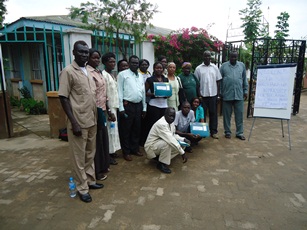South Sudan: Plan International launches two-year education program
By Julius N. Uma
August 25, 2011 (JUBA) – Plan International has, in a bid to boost education in South Sudan, officially launched a two year project targeting 3,000 girls and 2,000 boys.

The counties of Rokon, Lainya, Terekeka and Yei in Central Equatoria state will reportedly benefit from this project, courtesy of funding from Plan Sweden.
Speaking during a one-day orientation held in Juba, the South Sudan capital, Domini Mutabazi, the acting country director Plan South Sudan, underscored the vital role education plays in the development of any nation.
“The project is aimed at increasing the number of girls accessing education by limiting the numbers of girls being subjected to early marriages as well as supporting married young girls to stay in school,” he said.
Mutabazi urged the South Sudanese population to embrace the culture of sending children to schools, saying depriving the young ones of access to education is a violation of their fundamental human rights.
David Lowilla, the state director general in the ministry of education, science and technology decried the low rate of female enrolment in schools across the country, agitating for the full implementation of the female education policy.
“When you train a girl, you educate a nation. This is a common quote that South Sudan needs to adopt,” he said, while urging all stakeholders attending the workshop to help Plan International in the implementation the project.
Tobias Loyata, the organisation’s program support manager reiterated Plan South Sudan’s commitment toward the promotion of girls’ education, saying their work is underpinned by the UN Convention on the Rights of the Child.
Recently, while addressing the first opening of the newly created National Assembly, South Sudan President, Salva Kiir said improving the country’s education sector remains a key priority in the implementation of the much-hyped South Sudan Development Plan (SSDP).
South Sudan’s literacy rate is 73 percent according to the Ministry of Education, 27 percent according to the CIA and one of the lowest in the world according to most observers.
An estimated 340,000 children, according to the UN Children’s Fund (UNICEF), were enrolled in primary schools at the time Sudan’s 2005 Comprehensive Peace Agreement was signed.
In 2009, it adds, primary school enrolment was at 1,362,941 – about 860,000 boys and 502,000 girls. But, according to UN Education, Scientific and Cultural Organization (UNESCO), less than two percent of these children complete their primary school education.
(ST)

kwel mark
South Sudan: Plan International launches two-year education program
What is meant by corruption? who stir it?.
If all these kinds of Organizations are filled up with people from one specific tribe and neglect the rest without participating in such South Sudan’s developments . If the kind of organizations were to be headed by the so called A Dinka it will be a woes,fight , quarrel and even death …
Basing the girls education in all the parts of EES mean nothing other than creating inequality among the young ladies in the country ..
Let the whole south see how Equatorians are taking up jobs in all the organizations that comes across in Juba with their forged certificates .
Corruption is not meant only to be in Government institutions